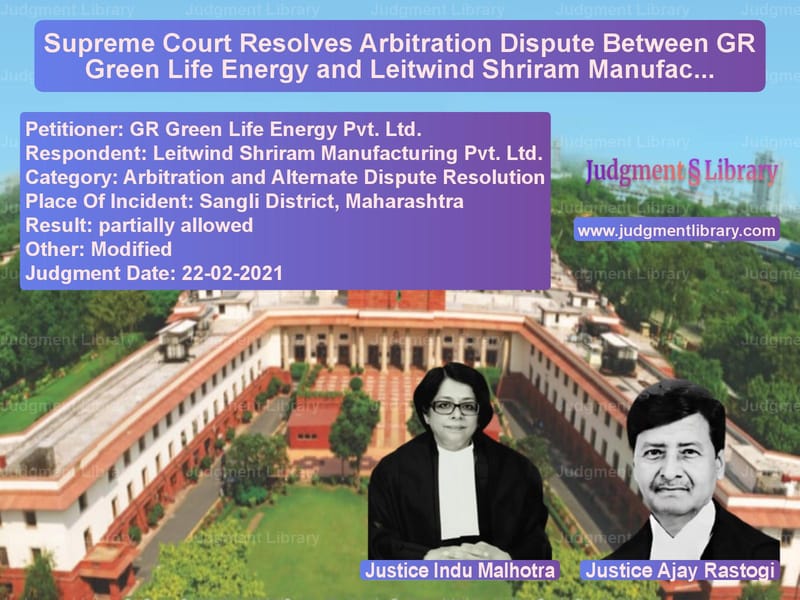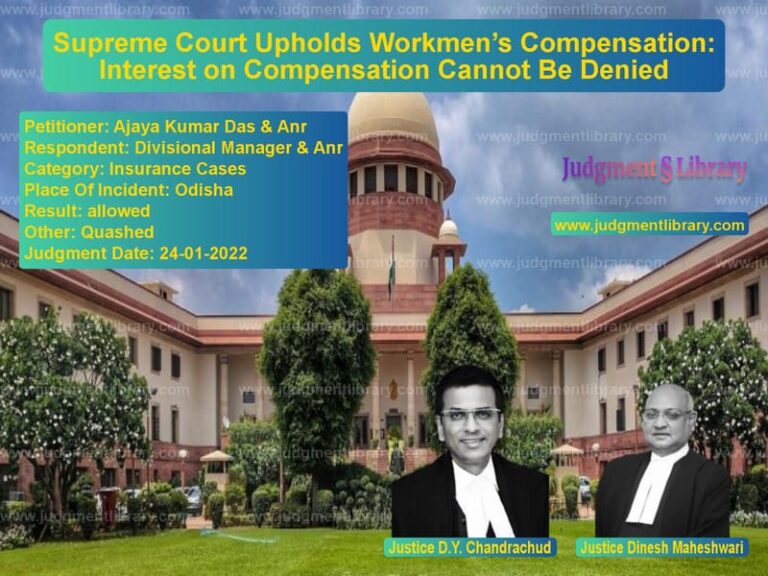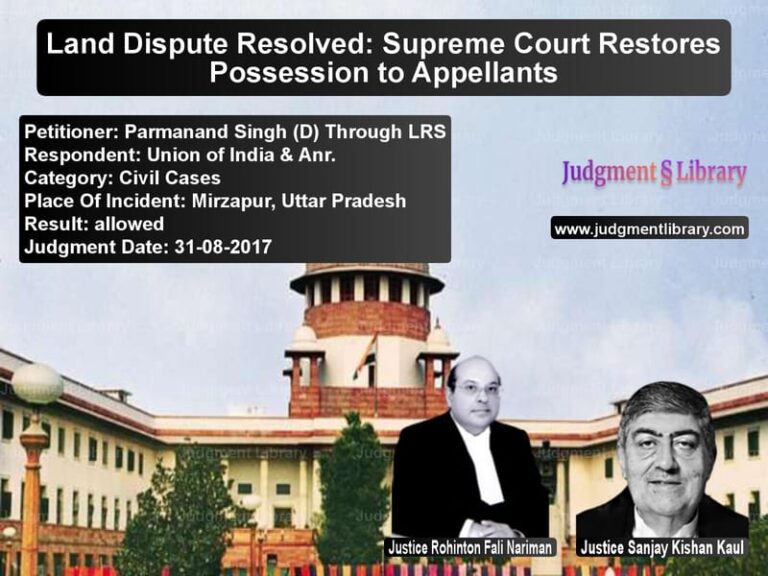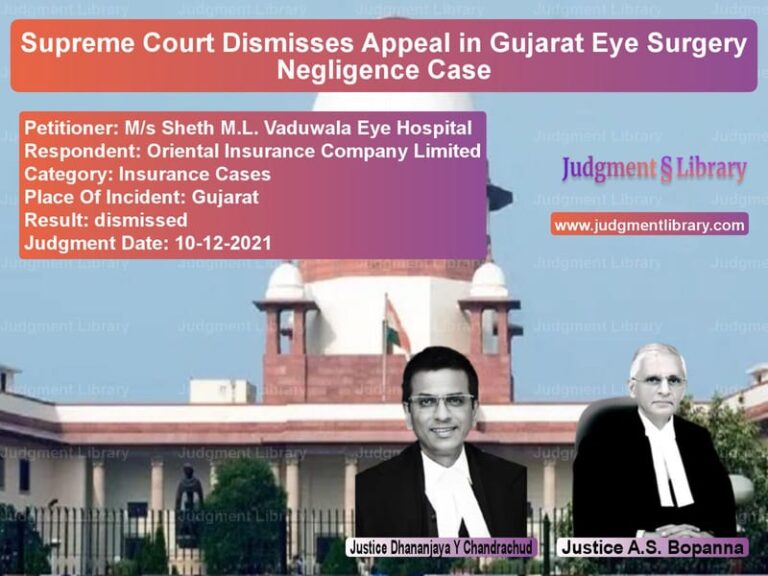Supreme Court Resolves Arbitration Dispute Between GR Green Life Energy and Leitwind Shriram Manufacturing
The Supreme Court of India recently ruled in the case of GR Green Life Energy Pvt. Ltd. vs. Leitwind Shriram Manufacturing Pvt. Ltd., addressing the arbitration proceedings related to a contractual dispute between the two parties. The judgment, delivered on February 22, 2021, provided clarity on the applicability of arbitration clauses in contractual agreements and the interplay between the Arbitration and Conciliation Act, 1996, and the Micro, Small, and Medium Enterprises Development (MSMED) Act, 2006.
The case revolved around a Development Agreement signed on February 10, 2014, under which the appellant, GR Green Life Energy, was to establish a wind farm project in Maharashtra. The agreement contained a specific arbitration clause, which became the center of contention when disputes arose.
Background of the Case
Contractual Agreement and Disputes
GR Green Life Energy Pvt. Ltd. (the appellant) entered into a Development Agreement with Leitwind Shriram Manufacturing Pvt. Ltd. (the respondent) for setting up a wind farm project in Sangli District, Maharashtra. The agreement stipulated that any disputes arising between the parties would be referred to arbitration under the Arbitration and Conciliation Act, 1996.
Arbitration Clause in the Agreement
The arbitration clause in the agreement stated:
“All disputes, differences, and claims concerning the project work shall be referred to arbitration to be held at Chennai under the Arbitration and Conciliation Act, 1996. The arbitration panel shall consist of three arbitrators—one appointed by each party, and the third presiding arbitrator to be appointed by the nominated arbitrators.”
Disputes and Legal Action
- GR Green Life Energy Pvt. Ltd. issued a legal notice on April 21, 2018, seeking payment of outstanding dues amounting to ₹3.26 crores.
- Leitwind Shriram Manufacturing Pvt. Ltd. rejected these claims through a letter dated January 21, 2019, alleging that the appellant had failed to fulfill contractual obligations. The respondent also claimed that the appellant was liable to refund ₹10.26 crores with 15% interest and pay liquidated damages of ₹1.54 crores.
- Following the dispute, the respondent invoked arbitration under Clause 20 of the agreement and appointed an arbitrator. However, the appellant did not appoint its arbitrator, leading the respondent to approach the Madras High Court under Section 11(6) of the Arbitration and Conciliation Act for the appointment of an arbitrator on behalf of the appellant.
Appellant’s Registration Under the MSMED Act
While the arbitration proceedings were pending, GR Green Life Energy Pvt. Ltd. registered itself under the Micro, Small, and Medium Enterprises Development (MSMED) Act, 2006. The appellant then initiated proceedings before the Facilitation Council in Pune, contending that all disputes should be resolved under the MSMED Act instead of arbitration.
Madras High Court’s Decision
The Madras High Court ruled that the MSMED Act does not provide a mechanism for dealing with counterclaims. Therefore, it held that since both parties had agreed to arbitration under their contractual agreement, the disputes must be referred to a three-member arbitration tribunal under the Arbitration and Conciliation Act, 1996.
Supreme Court’s Observations and Ruling
Interplay Between the MSMED Act and Arbitration Act
The Supreme Court examined whether the MSMED Act, which provides a statutory mechanism for dispute resolution, could override an arbitration agreement signed between the parties. The Court observed:
“While the MSMED Act has an overriding effect, it does not provide for the adjudication of counterclaims. The arbitration agreement remains binding unless explicitly set aside by law.”
Appointment of Arbitrator
The Court noted that during the course of the proceedings, both parties had agreed to have their disputes adjudicated by a single arbitrator appointed by the Court, instead of the three-member tribunal initially agreed upon in the contract. Consequently, the Court modified the arbitration clause and appointed Justice K. Kannan, a retired judge of the Madras High Court, as the sole arbitrator.
Final Judgment
- The Supreme Court ruled that the arbitration agreement between the parties remains binding.
- It modified Clause 20 of the agreement, appointing a sole arbitrator instead of a three-member tribunal.
- Justice K. Kannan was appointed as the sole arbitrator to adjudicate all claims and counterclaims.
- The arbitration proceedings would be conducted under the Madras High Court Arbitration Centre as per its rules.
- The Facilitation Council case initiated by the appellant under the MSMED Act would be closed.
Key Takeaways from the Judgment
- Arbitration clauses in contracts remain enforceable even if a party registers under the MSMED Act at a later stage.
- MSMED Act does not provide for counterclaims, and disputes with counterclaims may still be resolved through arbitration.
- Court-appointed arbitrators ensure neutrality and efficiency in resolving commercial disputes.
- Parties can modify arbitration agreements by mutual consent, and courts can facilitate such modifications.
- Facilitation Council proceedings cannot override a pre-existing arbitration agreement if counterclaims exist.
Impact of the Judgment
The ruling has significant implications for commercial contracts and arbitration law in India. By upholding the sanctity of arbitration agreements while recognizing the statutory provisions of the MSMED Act, the Supreme Court has provided clarity on dispute resolution mechanisms applicable to commercial entities.
The decision ensures that businesses cannot unilaterally escape arbitration obligations by subsequently registering under the MSMED Act. It also reinforces the judiciary’s role in appointing independent arbitrators when disputes arise.
Conclusion
The Supreme Court’s judgment in GR Green Life Energy Pvt. Ltd. vs. Leitwind Shriram Manufacturing Pvt. Ltd. upholds the enforceability of arbitration clauses and provides clarity on the role of the MSMED Act in contractual disputes. By appointing a single arbitrator and ensuring that arbitration proceeds efficiently, the ruling sets an important precedent in commercial dispute resolution in India.
Petitioner Name: GR Green Life Energy Pvt. Ltd..Respondent Name: Leitwind Shriram Manufacturing Pvt. Ltd..Judgment By: Justice Indu Malhotra, Justice Ajay Rastogi.Place Of Incident: Sangli District, Maharashtra.Judgment Date: 22-02-2021.
Don’t miss out on the full details! Download the complete judgment in PDF format below and gain valuable insights instantly!
Download Judgment: gr-green-life-energy-vs-leitwind-shriram-man-supreme-court-of-india-judgment-dated-22-02-2021.pdf
Directly Download Judgment: Directly download this Judgment
See all petitions in Arbitration Act
See all petitions in Dispute Resolution Mechanisms
See all petitions in Enforcement of Awards
See all petitions in Judgment by Indu Malhotra
See all petitions in Judgment by Ajay Rastogi
See all petitions in partially allowed
See all petitions in Modified
See all petitions in supreme court of India judgments February 2021
See all petitions in 2021 judgments
See all posts in Arbitration and Alternate Dispute Resolution Category
See all allowed petitions in Arbitration and Alternate Dispute Resolution Category
See all Dismissed petitions in Arbitration and Alternate Dispute Resolution Category
See all partially allowed petitions in Arbitration and Alternate Dispute Resolution Category







